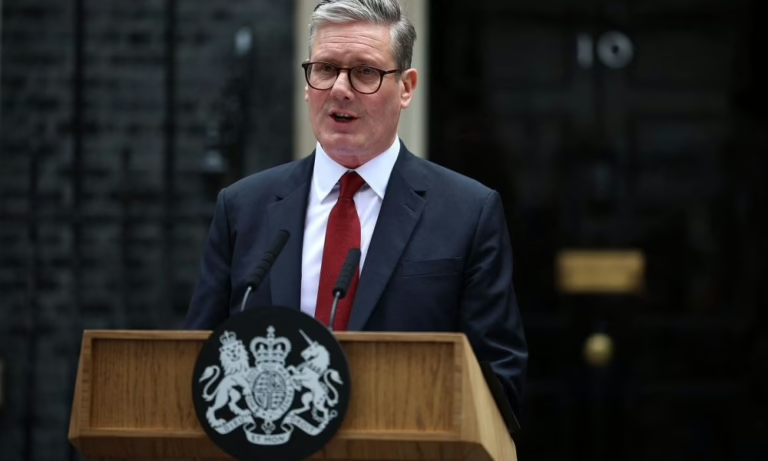In a landmark development signaling a profound change in Western foreign policy, the United Kingdom, Canada, and Australia officially acknowledged the State of Palestine on Sunday. This unprecedented move marks a pivotal shift in the international community’s stance on the Israeli-Palestinian conflict and has provoked immediate and strong criticism from Israel.
The declarations were made just before the United Nations General Assembly convened in New York, where global leaders are increasingly rallying behind the pursuit of a twogaza-vengeance-overreach/” title=”…: When Vengeance Crosses the Line”>-state solution amid the ongoing humanitarian crisis in Gaza.
UK Prime Minister Keir Starmer announced on X, “Today, to rekindle the prospects for peace between Palestinians and Israelis and to support a twosunday/” title=”… Poised to Make Historic Move: Set to Recognise Palestinian … This … | … Update”>-state framework, the United Kingdom formally recognizes the State of Palestine.”
Canada quickly followed, becoming the first G7 nation to take this controversial step-a stance historically avoided by major Western powers that have maintained Palestinian statehood should be achieved through direct negotiations with Israel.
Canadian Prime Minister Mark Carney stated, “Canada recognizes the State of Palestine and commits to partnering in fostering a peaceful future for both Palestine and Israel.”
While Palestinian officials and advocates for a two-state resolution welcomed the decision, Israel’s response was swift and vehement. Prime Minister Benjamin Netanyahu condemned the recognition, warning that such moves threaten Israel’s security and reward acts of terrorism.
Netanyahu declared, “Calls for Palestinian statehood jeopardize our existence and represent an illogical concession to terrorism.”
Later on Sunday, Portugal also announced its intention to formally recognize Palestinian statehood during the UN summit.
Portuguese President Marcelo Rebelo de Sousa remarked, “By taking this step now, Portugal is preserving the possibility of achieving two sovereign states.”
This wave of recognition adds momentum to a growing international consensus: over 140 of the UN’s 193 member countries already acknowledge Palestine, though major Western nations have until now refrained from doing so.
The announcements come nearly two years into Israel’s intense military campaign in Gaza, launched in response to the October 7, 2023 Hamas attack, which resulted in 1,219 deaths, predominantly civilians, according to Israeli official data.
Israel’s retaliatory operations have devastated Gaza, with the health ministry reporting at least 65,208 fatalities, mostly civilians-a figure the United Nations deems credible. The region faces widespread displacement, famine, and infrastructure collapse.
In the UK, public pressure has mounted for government action. Monthly demonstrations have attracted thousands, and a recent YouGov survey found that two-thirds of Britons aged 18-25 support recognizing Palestine.
“Britain holds a unique responsibility to champion the two-state solution,” UK Deputy Prime Minister David Lammy emphasized during a UN address in July.
Britain’s historical involvement in Middle Eastern affairs stretches back over a century, notably with the 1917 Balfour Declaration, which laid the foundation for the establishment of Israel.
Nonetheless, the recognition comes with caveats. Starmer stressed the necessity of conditional progress, including halting Israeli annexation plans and ensuring humanitarian aid reaches Gaza. He also called on Hamas to release all hostages taken during the 2023 attack.
Speaking to the BBC, Lammy acknowledged the symbolic nature of the recognition while highlighting its limitations.
“Will this recognition provide food for children? No, that depends on humanitarian aid. Will it secure the release of hostages? That requires a ceasefire,” he said. “But it is a step toward preserving the two-state vision.”
From the Palestinian perspective, this recognition is far from merely symbolic; it carries significant political weight.
“Recognition is not just a gesture,” Palestinian Foreign Minister Varsen Aghabekian Shahin told AFP. “It delivers a clear message to Israel that their hopes of indefinite occupation are unrealistic.”
As the UN summit unfolds, attention turns to how other key players, including France, will respond. The endorsements from the UK, Canada, Australia, and Portugal indicate a notable shift in global diplomatic alignments, potentially revitalizing stalled peace negotiations.
Despite ongoing challenges-such as persistent violence, geopolitical rifts, and internal Palestinian political complexities-Sunday’s recognitions mark a significant advance for proponents of Palestinian sovereignty.
Whether this momentum will translate into concrete peace remains to be seen. Yet, as Lammy aptly noted, “much of this hinges on hope.”

















